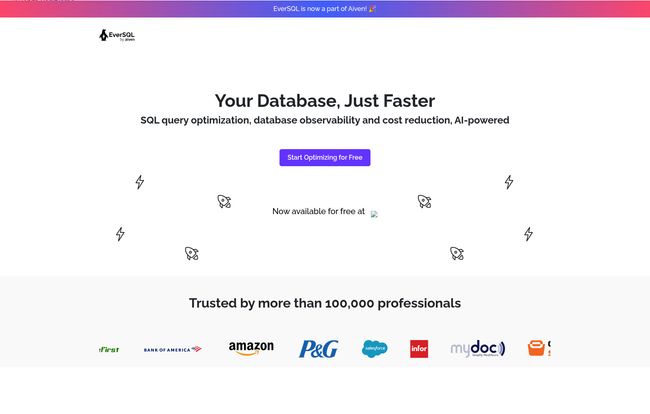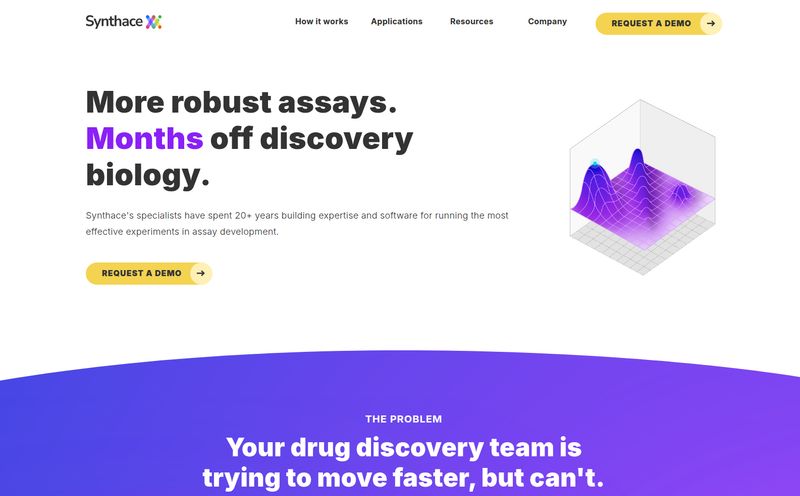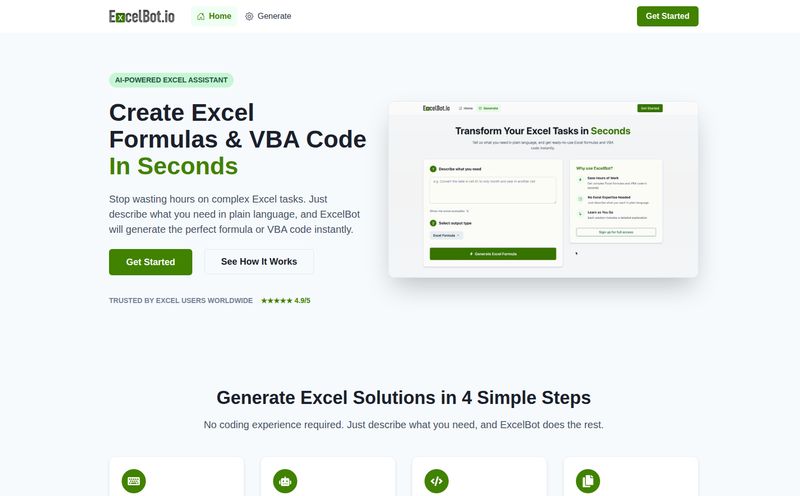We’ve all been there. It’s 4:45 PM on a Friday. You’re one `git push` away from freedom, and then it happens. The pager goes off. A critical dashboard has slowed to a crawl, and everyone’s pointing fingers at the database. Suddenly, your weekend plans are evaporating in a cloud of `EXPLAIN` plans and frantic query tuning.
For years, optimizing a database was a dark art. A specialized skill reserved for grizzled Database Administrators (DBAs) who could squint at a query plan and magically see the bottleneck. But what if you don't have a dedicated DBA on speed dial? What if you're a full-stack dev wearing a dozen hats already?
That's the exact problem a tool called EverSQL claims to solve. I’ve been hearing the name pop up in dev circles and on Twitter, so I figured it was time to take a look. They call themselves a "personal AI-powered DBA," which is a pretty bold claim. Let’s see if it holds up.
So, What Exactly is EverSQL?
At its core, EverSQL is an online platform designed to automatically optimize SQL queries and monitor database performance for PostgreSQL and MySQL. Think of it as a super-smart assistant that looks at your slow, clunky queries and rewrites them to be faster and more efficient. It’s not just about speed, though. The whole idea is to save you time, reduce your cloud infrastructure costs (because efficient queries use fewer resources), and prevent those Friday afternoon fire drills.
It’s built for engineers, by engineers, and you can kind of feel that in the approach. It’s less about flashy dashboards and more about getting a tangible, performance-boosting result without you needing to become a PhD in database indexing.
The Core Features That Actually Matter
A lot of tools throw a kitchen sink of features at you. I’m more interested in the ones that genuinely move the needle. From my analysis, EverSQL's power comes from a trio of core functionalities.
Automatic SQL Query Optimization: The Real Magic
This is the main event. You can literally paste a slow SQL query into EverSQL, and its AI gets to work. It analyzes the structure, the joins, the conditions, and then proposes optimized versions. I've seen it suggest new indexes that completely change the game for a query, turning something that took minutes into milliseconds. It's like having a senior database architect look over your shoulder and say, “Hey, try it this way instead.” But, you know, without the awkward small talk.
Ongoing Performance Insights: Your Database’s Health Monitor
This is where EverSQL moves from a one-off tool to a proper platform. You can install a non-intrusive sensor that continuously monitors your database activity. It’s a bit of a setup step, sure, but the payoff is proactive performance monitoring. It will automatically flag slow queries as they happen in your application, so you're not waiting for a user to complain. It’s like a Fitbit for your database, constantly tracking its vitals and letting you know when something’s up. This shift from reactive to proactive is, in my opinion, what separates a good tool from a great one.
Cost Reduction Recommendations
Let's talk about the thing your CFO really cares about: money. Faster queries aren't just for a better user experience. They directly translate into lower CPU usage, less memory consumption, and reduced I/O operations (IOPS). For anyone running on AWS, GCP, or Azure, you know that those metrics are tied directly to your monthly bill. EverSQL makes a point of connecting its optimizations to potential cost savings, which is a smart move and a powerful argument for getting it into your workflow.

Visit EverSQL
The Good, The Bad, and The... Need-to-Know
No tool is perfect, right? So let's get real. The best thing about EverSQL is that it just works. The interface is clean, and the free tools are genuinely useful for a quick check. The automatic optimization is impressive, and for a developer who's a database generalist, it feels like a superpower. It democratizes database performance.
On the flip side, there are a couple of things to be aware of. The monthly plans come with a specific number of "optimizations," and those credits don’t roll over. It’s a “use it or lose it” model, which I'm not a huge fan of, but I get it from a business perspective. Also, some of the more advanced continuous monitoring features are, unsurprisingly, locked behind the higher-tier subscriptions. You get what you pay for.
And that sensor installation for ongoing insights? While they say its non-intrusive, it's still an extra step and something you'll need the proper permissions for. For some teams in highly regulated environments, that might be a conversation. For most, it's probably a minor hurdle for a big benefit.
Let's Talk Money: A Look at EverSQL's Pricing
Pricing is always the million-dollar question, or in this case, the zero-to-several-thousand-dollar question. EverSQL has a tiered structure that seems to cater to everyone from a solo dev to a large enterprise. Here’s my quick breakdown:
- Free Plan: You get 1 optimization and can monitor 1 database per month, with a small data allowance. It’s perfect for testing the waters or for the occasional query sanity check. At $0, you can’t complain.
- Starter Plan: At $129/month, you get 10 optimizations/month and can monitor 1 database with more data. This feels right for a small startup or a solo developer who is serious about performance but doesn't have a massive database footprint.
- Plus Plan: For $490/month, this jumps up to 25 optimizations and 5 databases. This is clearly aimed at growing companies or teams with several applications and a more demanding performance environment.
- Enterprise Plan: The big one, at $2,898/month, offers 75 optimizations, 25 databases, and even includes an hour of consulting with their database experts. This is for large organizations where database performance is absolutely mission-critical.
The free plan is generous enough to prove its value. From there, the scaling seems logical. You just have to be mindful of that monthly optimization credit limit.
So, Who Is EverSQL Really For?
After digging in, I think EverSQL has a pretty clear audience. It’s a fantastic tool for:
- Full-stack developers who need to optimize queries but aren't database specialists.
- Startups and small businesses looking to keep their cloud costs low and their applications snappy without hiring a full-time DBA.
- Larger engineering teams that want to standardize their query optimization process and empower all developers to write better SQL.
If you're already a seasoned DBA with decades of experience, you might find it a bit basic. But for the 95% of us who aren't, it’s an incredibly powerful ally. It's a tool that fills a very real and very common gap in the development lifecycle.
Frequently Asked Questions about EverSQL
1. Does EverSQL support databases other than PostgreSQL and MySQL?
As of now, EverSQL is specifically focused on optimizing PostgreSQL and MySQL databases. These are two of the most popular open-source databases, so it covers a huge portion of the market, but if you're on SQL Server, Oracle, or something else, you'll have to look elsewhere.
2. Is installing the performance sensor safe?
EverSQL states their sensor is non-intrusive and designed to have a negligible impact on your database's performance. It works by observing performance metadata rather than interfering with operations. However, as with any third-party tool accessing your environment, you should follow your company's security protocols and review their documentation.
3. What happens if I go over my monthly optimization limit?
Once you use up your monthly optimization credits for your plan, you'll need to wait until the next billing cycle for them to reset. This is why it's important to choose a plan that aligns with your team's typical needs. You can't buy extra credits on an ad-hoc basis.
4. Can EverSQL fix application logic errors?
No, and this is an important distinction. EverSQL is a SQL optimizer. It can take an inefficient query and make it run faster. It cannot fix a query that is logically incorrect (e.g., pulling the wrong data or joining tables incorrectly to get a bad result). It fixes performance, not business logic.
5. Is there a free trial for the paid plans?
EverSQL's model is a bit different. They offer a perpetually Free plan which serves as a sort of indefinite trial. This lets you use the core features on a limited basis to see if it works for you before committing to a paid subscription.
My Final Verdict on EverSQL
Look, I'm naturally skeptical of anything that calls itself "AI-powered," but I'm walking away from this one genuinely impressed. EverSQL isn't trying to be a magical black box that solves all your problems. Its a focused, practical tool that tackles one of the most persistent and frustrating problems in software development: slow databases.
The idea of a "personal AI-powered DBA" might be marketing speak, but it's not far from the truth. It gives developers the power of a database expert, on-demand. For the time it saves and the performance headaches it prevents, I think it’s a tool that will pay for itself pretty quickly for the right team. If you've ever lost an afternoon to a slow query, you owe it to yourself to check out their free plan.
References and Sources
- EverSQL Official Website: https://www.eversql.com/
- EverSQL Pricing Information: https://www.eversql.com/pricing



